Abstract
Purpose
The aim of this study was to evaluate the heat generation in bone in vitro during the guided flapless drilling procedure and the effect of drilling methods on the heat generation.
Materials and methods
A model that has missing the first and second mandibular molars bilaterally was used. In group A, classical flap implant surgery was performed. In group B, flapless implant surgery using surgical guide was performed. In group C, flapless implant surgery using surgical guide without up-and-down pumping motion was performed. Temperature was measured with k-type thermocouple and a real-time digital thermometer. The thermocouples were placed at 0.5 mm away from the osteotomy area at the depths of 3 mm and 6 mm. The measured values were evaluated with independent t-test.
Results
The mean temperature generated was 27.2℃ (SD ± 2.1℃) and 27.5℃ (SD ± 2.3℃) for groups A and B, respectively. These differences were not statistically significant. In group C, the mean temperature was 37.0℃ (SD ± 3.4℃). There were statistically significant differences between groups B and C with respect to the mean temperature.
REFERENCES
1.Branemark PI., Hansson BO., Adell R., Breine U., Lindstro¨m J., Halle′n O., Ohman A. Osseointegrated implants in the treatment of the edentulous jaw. Experience from a 10-year period. Scand J Plast Reconstr Surg Suppl. 1977. 16:1–132.
2.Misch K., Wang HL. Implant surgery complications: etiology and treatment. Implant Dent. 2008. 17:159–68.

3.McDermott NE., Chuang SK., Woo VV., Dodson TB. Complications of dental implants: identification, frequency, and associated risk factors. Int J Oral Maxillofac Implants. 2003. 18:848–55.

4.Park SH., Wang HL. Implant reversible complications: classification and treatments. Implant Dent. 2005. 14:211–20.

5.Greenstein G., Cavallaro J., Romanos G., Tarnow D. Clinical recommendations for avoiding and managing surgical complications associated with implant dentistry: a review. J Periodontol. 2008. 79:1317–29.

6.Rahman AU., Rehman TU., Qureshi I., Hashim M., Warris N., Mateen S. Pre surgical perception of pain, post surgical pain and its management for patients undergoing dental implant therapy. J Pak Dent Assoc. 2012. 21:5–11.
7.Jaffin RA., Kumar A., Berman CL. Immediate loading of implants in partially and fully edentulous jaws: a series of 27 case reports. J Periodontol. 2000. 71:833–8.

8.Canullo L., Fedele GR., Iannello G., Jepsen S. Platform switching and marginal bone-level alterations: the results of a randomized-controlled trial. Clin Oral Implants Res. 2010. 21:115–21.

9.Cannizzaro G., Leone M., Consolo U., Ferri V., Esposito M. Immediate functional loading of implants placed with flapless surgery versus conventional implants in partially edentulous patients: a 3-year randomized controlled clinical trial. Int J Oral Maxillofac Implants. 2008. 23:867–75.
10.Van der Zee E., Oosterveld P., Van Waas MA. Effect of GBR and fixture installation on gingiva and bone levels at adjacent teeth. Clin Oral Implants Res. 2004. 15:62–5.

11.Brodala N. Flapless surgery and its effect on dental implant outcomes. Int J Oral Maxillofac Implants. 2009. 24:118–25.
12.Jeong SM., Choi BH., Kim J., Xuan F., Lee DH., Mo DY., Lee CU. A 1-year prospective clinical study of soft tissue conditions and marginal bone changes around dental implants after flapless implant surgery. Oral Surg Oral Med Oral Pathol Oral Radiol Endod. 2011. 111:41–6.

13.Becker W., Wikesjo¨ UM., Sennerby L., Qahash M., Hujoel P., Goldstein M., Turkyilmaz I. Histologic evaluation of implants following flapless and flapped surgery: a study in canines. J Periodontol. 2006. 77:1717–22.

14.Azari A., Nikzad S. Flapless implant surgery: review of the literature and report of 2 cases with computer-guided surgical approach. J Oral Maxillofac Surg. 2008. 66:1015–21.

15.Sudbrink SD. Computer-guided implant placement with immediate provisionalization: a case report. J Oral Maxillofac Surg. 2005. 63:771–4.

16.Brisman DL. The effect of speed, pressure, and time on bone temperature during the drilling of implant sites. Int J Oral Maxillofac Implants. 1996. 11:35–7.
17.Kerawala CJ., Martin IC., Allan W., Williams ED. The effects of operator technique and bur design on temperature during osseous preparation for osteosynthesis self-tapping screws. Oral Surg Oral Med Oral Pathol Oral Radiol Endod. 1999. 88:145–50.

18.Harris BH., Kohles SS. Effects of mechanical and thermal fatigue on dental drill performance. Int J Oral Maxillofac Implants. 2001. 16:819–26.
19.Sener BC., Dergin G., Gursoy B., Kelesoglu E., Slih I. Effects of irrigation temperature on heat control in vitro at different drilling depths. Clin Oral Implants Res. 2009. 20:294–8.
20.Ercoli C., Funkenbusch PD., Lee HJ., Moss ME., Graser GN. The influence of drill wear on cutting efficiency and heat production during osteotomy preparation for dental implants: a study of drill durability. Int J Oral Maxillofac Implants. 2004. 19:335–49.
21.Branemark PI., Zarb GA., Albrektsson T. Tissue-Integrated Prostheses: Osseointegration in Clinical Dentistry. Chicago, IL, Quintessence pub.;1985. p. 129–43.
22.Chacon GE., Bower DL., Larsen PE., McGlumphy EA., Beck FM. Heat production by 3 implant drill systems after repeated drilling and sterilization. J Oral Maxillofac Surg. 2006. 64:265–9.

23.Collins DH. Structural changes around nails and screws in human bones. J Pathol. 1953. 65:109–21.

24.Moss RW. Histopathologic reaction of bone to surgical cutting. Oral Surg Oral Med Oral Pathol. 1964. 17:405–14.

25.Lavelle C., Wedgwood D. Effect of internal irrigation on frictional heat generated from bone drilling. J Oral Surg. 1980. 38:499–503.
26.Matthews LS., Hirsch C. Temperatures measured in human cortical bone when drilling. J Bone Joint Surg Am. 1972. 54:297–308.

27.Ludewig R. Temperaturmessungen beim Knochensagen (thesis). Gissen: Univ. of Gissen;1972.
28.Rhinelander FW., Nelson CL., Stewart RD., Stewart CL. Experimental reaming of the proximal femur and acrylic cement implantation: vascular and histologic effects. Clin Orthop Relat Res. 1979. 141:74–89.
29.Berman AT., Reid JS., Yanicko DR Jr., Sih GC., Zimmerman MR. Thermally induced bone necrosis in rabbits. Relation to implant failure in humans. Clin Orthop Relat Res. 1984. 186:284–92.
30.Eriksson A., Albrektsson T., Grane B., McQueen D. Thermal injury to bone. A vital-microscopic description of heat effects. Int J Oral Surg. 1982. 11:115–21.
31.Eriksson AR., Albrektsson T. Temperature threshold levels for heat-induced bone tissue injury: a vital-microscopic study in the rabbit. J Prosthet Dent. 1983. 50:101–7.

32.Eriksson RA., Albrektsson T. The effect of heat on bone regeneration: an experimental study in the rabbit using the bone growth chamber. J Oral Maxillofac Surg. 1984. 42:705–11.

33.Misir AF., Sumer M., Yenisey M., Ergioglu E. Effect of surgical drill guide on heat generated from implant drilling. J Oral Maxillofac Surg. 2009. 67:2663–8.

34.Rogers HJ., Weidmann SM., Parkinson A. Studies on the skeletal tissues. II. The collagen content of bones from rabbits, oxen and humans. Biochem J. 1952. 50:537–42.
36.Esposito M., Grusovin MG., Maghaireh H., Coulthard P., Worthington HV. Interventions for replacing missing teeth: management of soft tissues for dental implants. Cochrane Database Syst Rev. 2007. 3:CD006697.

37.Holst S., Blatz MB., Eitner S. Precision for computer-guided implant placement: using 3D planning software and fixed intraoral reference points. J Oral Maxillofac Surg. 2007. 65:393–9.

38.Haider R., Watzek G., Plenk H. Effects of drill cooling and bone structure on IMZ implant fixation. Int J Oral Maxillofac Implants. 1993. 8:83–91.
39.Benington IC., Biagioni PA., Crossey PJ., Hussey DL., Sheridan S., Lamey PJ. Temperature changes in bovine mandibular bone during implant site preparation: an assessment using infra-red thermography. J Dent. 1996. 24:263–7.

40.Misch CE. Density of Bone: Effects on surgical approach and healing, In: Contemporary Implant Dentistry. 3rd ed.St. Louis, MO: Mosby;2008. p. 645–67.
41.Yacker MJ., Klein M. The effect of irrigation on osteotomy depth and bur diameter. Int J Oral Maxillofac Implants. 1996. 11:634–8.
42.Vachon RL., Walker FJ., Walder DF., Nex GH. In vivo determination of thermal conductivity of bone using the thermal comparator technique. In: Jacobson B (ed). Digest of the Seventh International Conference of Medical and Biological Engineering.
43.Watanabe F., Tawada Y., Komatsu S., Hata Y. Heat distribution in bone during preparation of implant sites: heat analysis by realtime thermography. Int J Oral Maxillofac Implants. 1992. 7:212–9.
Fig. 8.
Diagram showing the relationship between the location of thermocouples and implant drilling site. Thermocouples were located 0.5 mm away from the boundary of final implant drill (diameter 3.8 mm) and 3 mm lingual and 6 mm buccal, in depth.
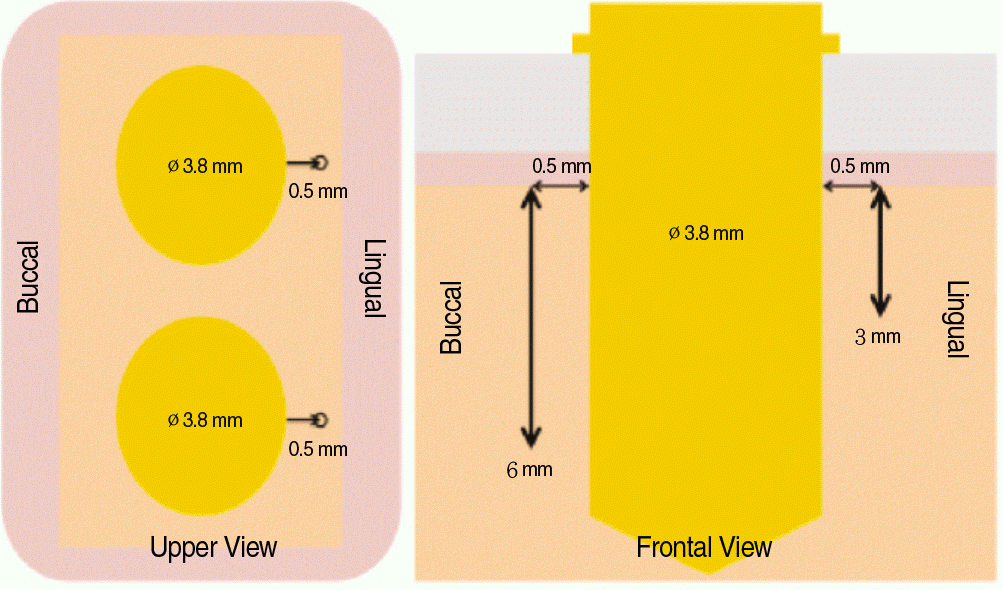
Fig. 9.
Implant drilling for group A. For flap elevated group (A), implant drilling was done by opening the buccal side of the surgical guide in order for irrigation from the handpiece as well as additional extrenal (syringe) irrigation to reach the drilling site effectively.
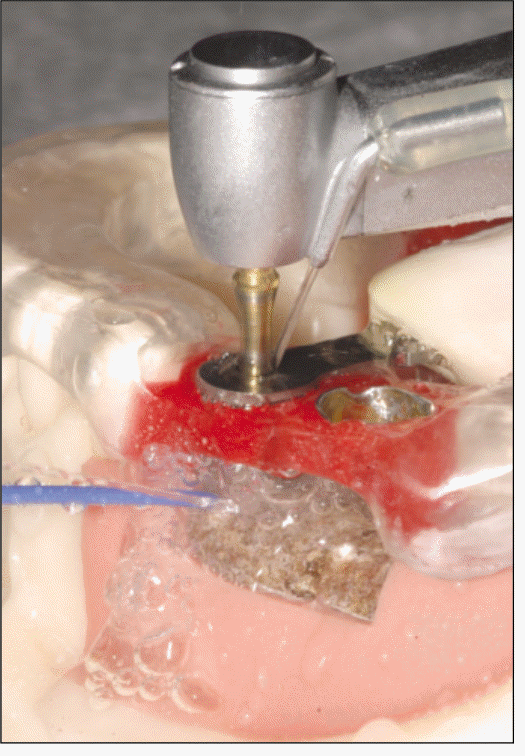
Fig. 10.
Implant drilling for group B and C. For flapless implant groups (B and C) after the surgical guide was placed, implant drilling was carried out only using irrigation from the handpiece with and without up-and-down pumping motion, respectively.
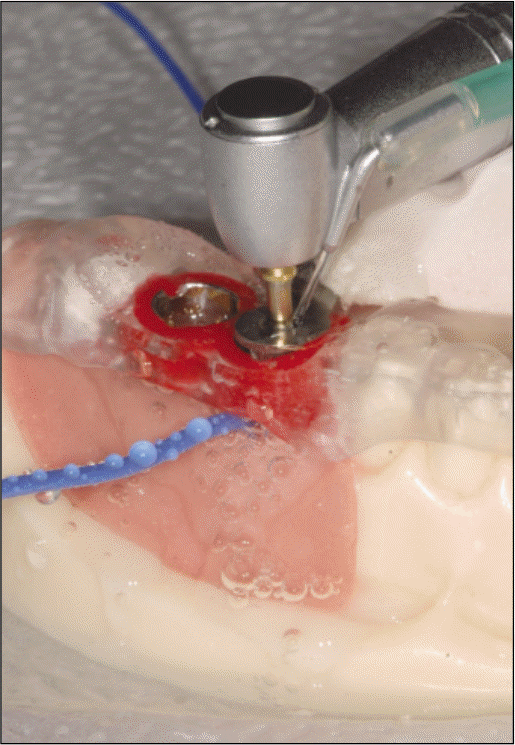




 PDF
PDF ePub
ePub Citation
Citation Print
Print


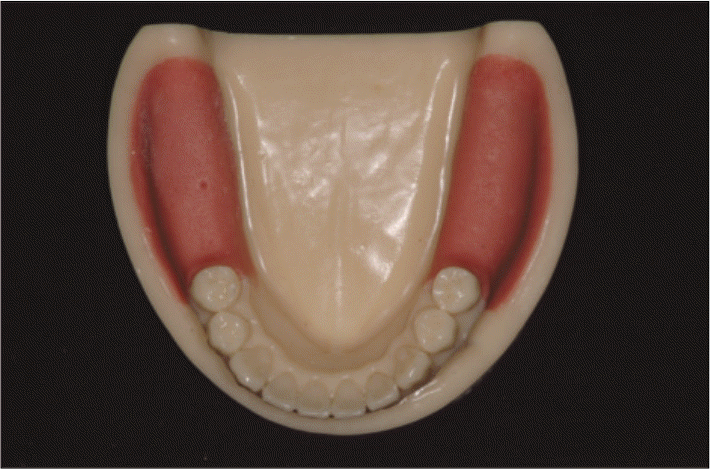
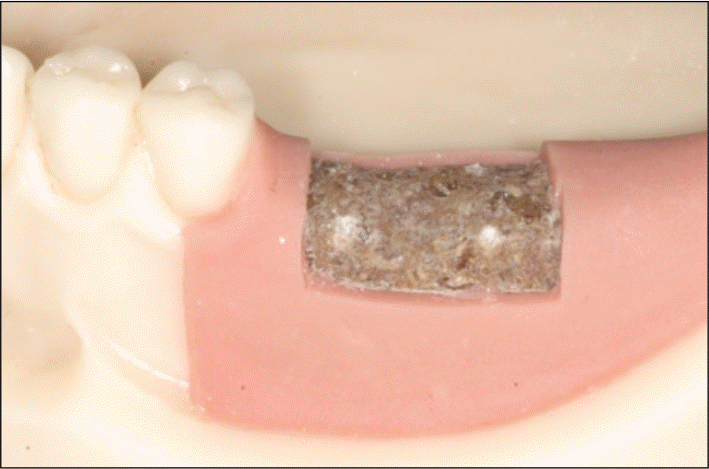
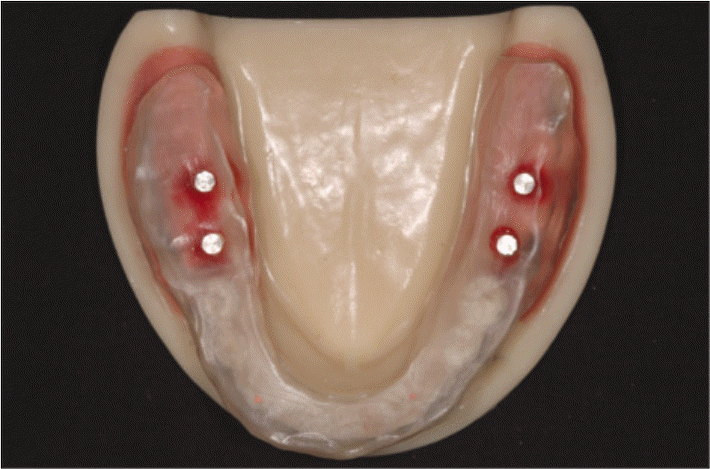
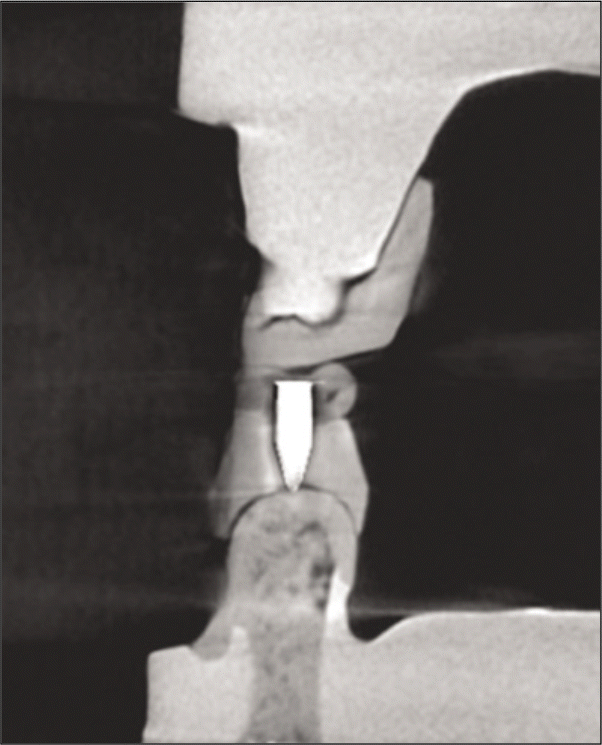
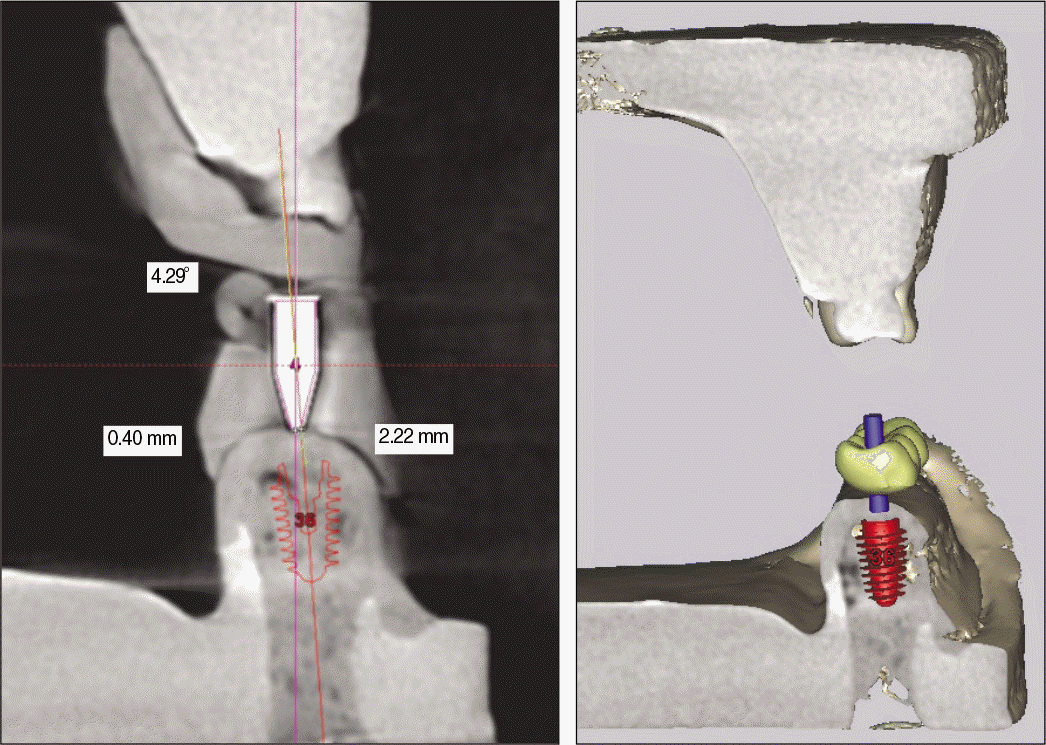
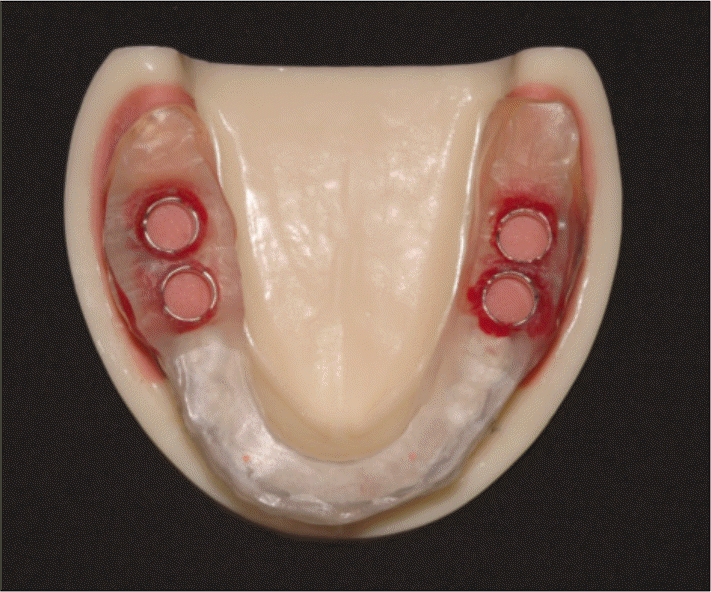
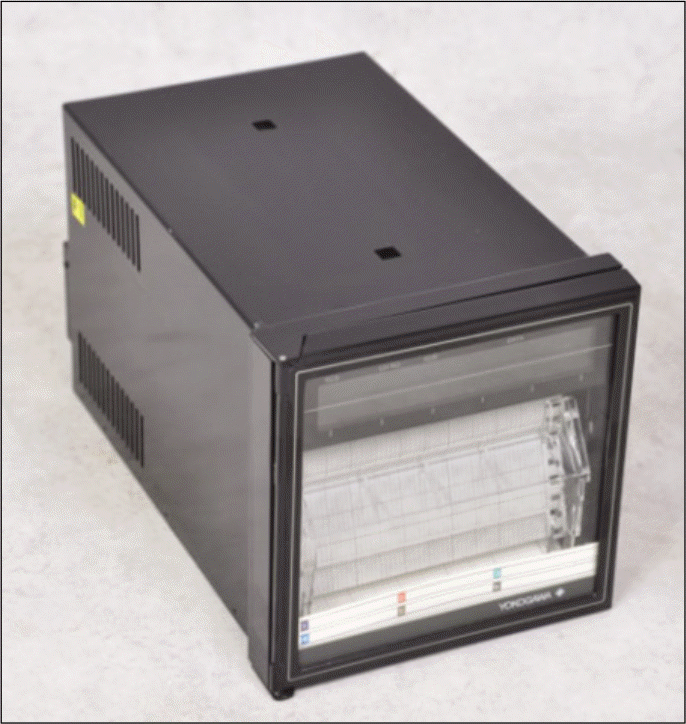
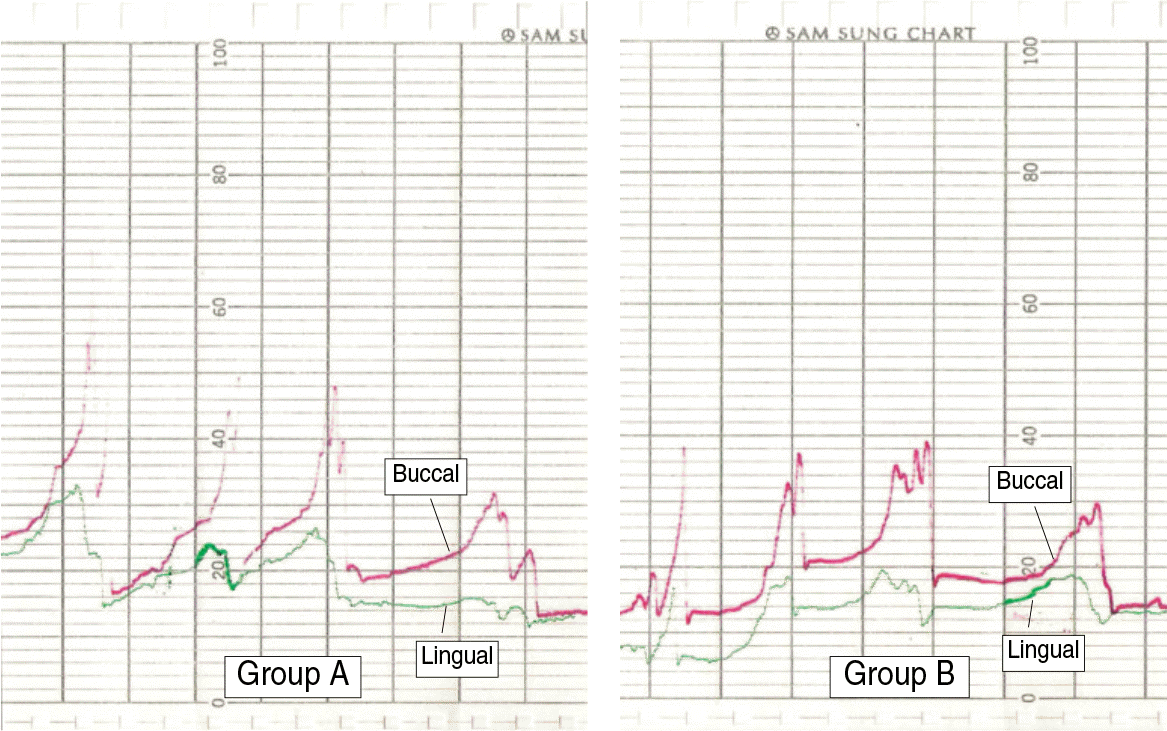
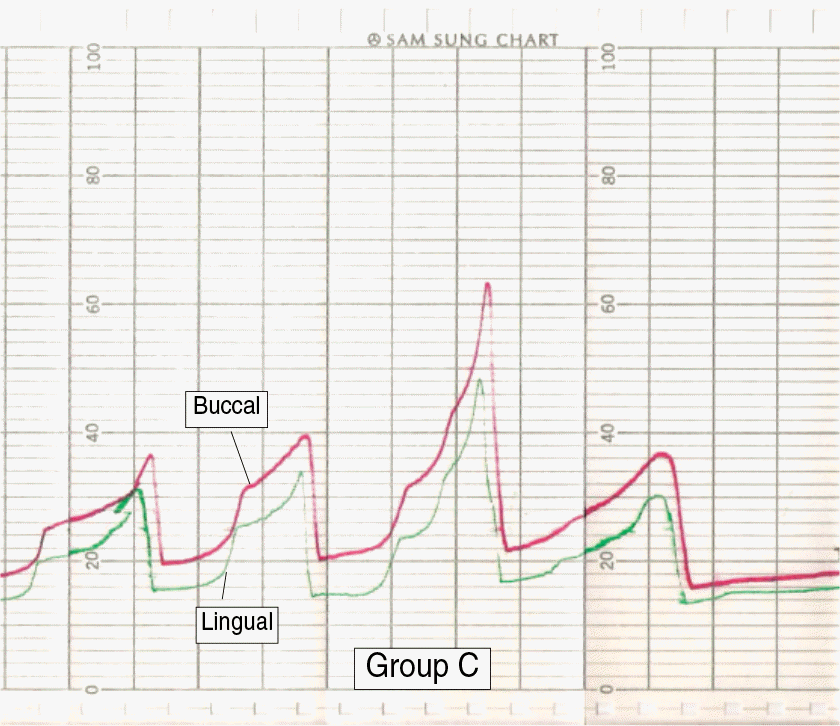
 XML Download
XML Download